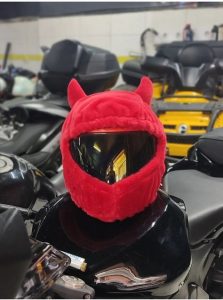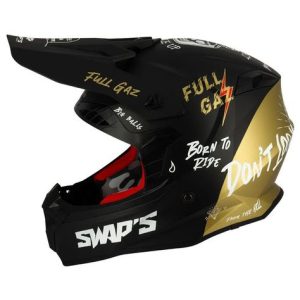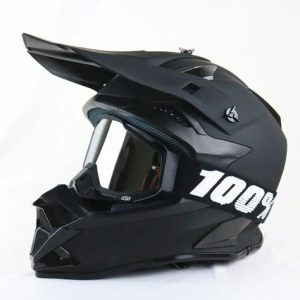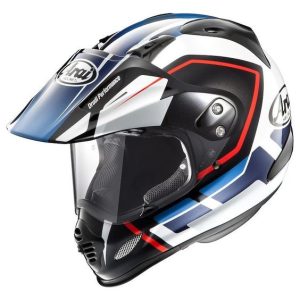Jun 13, 2024
Finding the Right Motorcycle Helmet for You
A motorcycle helmet is the single most important piece of safety gear you can wear when riding. It protects your head in the event of a crash, and choosing the right helmet is essential for optimal protection and comfort. This article explores factors to consider when selecting a motorcycle helmet, along with different helmet types.
Why Helmets Matter
Motorcycle riders are much more vulnerable than car drivers in a crash. A helmet can significantly reduce the risk of head injury and death. Here are some ways helmets protect riders:
Impact absorption:
The helmet shell absorbs the impact of a crash, distributing the force over a wider area and reducing the impact on the skull.
Liner protection:
The inner liner of the helmet helps to cradle the head and absorb some of the impact energy.
Visor protection:
The visor shields the face from debris and wind.

Choosing the Right Helmet
There are many motorcycle helmets on the market, so it’s important to consider your needs and preferences when making a choice. Here are some factors to consider:
-
Helmet type: There are different types of motorcycle helmets, each with its own advantages and disadvantages.
-
Fit: A helmet should fit snugly but comfortably. It should not be too loose or too tight.
-
Safety ratings: Look for a helmet that meets safety standards set by organizations like the U.S. Department of Transportation (DOT) or the Snell Memorial Foundation.
-
Features: Some helmets come with features like visors that can be opened or closed, sun shields, and ventilation systems.
-
Comfort: You’ll be wearing your helmet for long rides, so it’s important to choose one that is comfortable.
Types of Motorcycle Helmets
There are three main types of motorcycle helmets:
Full-face helmets: These helmets offer the most protection, covering the entire head, face, and neck.
Modular helmets: Modular helmets, also known as flip-up helmets, have a chin bar that can be flipped up, making it easier to put on and take off the helmet and talk to people when stopped.
Half helmets: Half helmets, also known as open-face helmets, offer less protection than full-face or modular helmets. They cover the top and back of the head, but leave the face exposed.
Getting Fitted for a Helmet
It is important to get fitted for a motorcycle helmet by a qualified professional. A proper fitting will ensure that the helmet fits snugly and comfortably and provides the best possible protection. Here’s what to expect during a helmet fitting:
-
The salesperson will measure your head to determine the correct helmet size.
-
They will help you try on different helmets to find one that fits comfortably.
-
The helmet should not move around too much when you shake your head.
-
The cheek pads should feel snug but not too tight.
-
The visor should close and open easily.
Additional Tips for Choosing a Helmet
Here are some additional tips for choosing a motorcycle helmet:
-
Set a budget: Motorcycle helmets can range in price from around $100 to $1,000 or more. Decide how much you are willing to spend before you start shopping.
-
Consider the climate: If you live in a hot climate, you may want to choose a helmet with a good ventilation system.
-
Think about noise: Motorcycle helmets can be noisy. Look for a helmet with good noise-reduction features.
-
Buy from a reputable dealer: Buy your helmet from a reputable motorcycle dealer who can help you choose the right helmet and ensure it fits properly.
Taking the time to choose the right motorcycle helmet is an important investment in your safety. Consider the factors mentioned above and get fitted by a professional to find a helmet that fits you comfortably and provides the best possible protection. Remember, the most expensive helmet isn’t always the best. Find one that fits your needs and budget.
A motorcycle helmet is the single most important piece of safety gear you can wear when riding. It protects your head in the event of a crash, and choosing the right helmet is essential for optimal protection and comfort. This article explores factors to consider when selecting a motorcycle helmet, along with different helmet types.
Finding the Perfect Helmet for You
The best motorcycle helmet for you depends on your individual needs and riding style. Here are some important factors to consider that will help you narrow down your choices:
-
Safety: Look for a helmet that meets the latest safety standards set by organizations like the U.S. Department of Transportation (DOT) or the Snell Memorial Foundation.
-
Comfort: You’ll be wearing your helmet for long rides, so it’s important to choose one that fits snugly and comfortably. A helmet should not cause any pressure points or restrict your movement.
-
Features: Consider the features that are important to you, such as a visor that can be opened or closed, a sun shield, or a ventilation system.
-
Riding style: Different helmet types are suited to different riding styles. Here’s a brief overview:
-
Full-face helmets: Offer the most protection, covering the entire head, face, and neck. Ideal for all riding styles, especially high-speed riding.
-
Modular helmets: Offer a good balance of protection and convenience, with a flip-up chin bar. Well-suited for touring riders who want to chat or eat/drink easily on breaks.
-
Half helmets: Offer less protection than other styles, leaving the face exposed. Primarily for short, low-speed rides around town.
-

Getting Help From the Experts
Motorcycle dealerships have experts who can answer your questions and help you find a helmet that fits you properly. They can also recommend helmets that are suited to your riding style and budget.
Remember, the most important factor is choosing a helmet that fits you comfortably and meets safety standards. When trying on helmets, take your time and make sure it feels secure without being too tight. Don’t hesitate to ask the salesperson for help!
Motorcycle dealerships have knowledgeable staff who can answer your questions and guide you towards a helmet that fits you properly. They can also recommend helmets suited to your riding style and budget.
Remember, the most important factor is choosing a helmet that fits you comfortably and meets safety standards. When trying on helmets, take your time and ensure it feels secure without being too tight. Don’t be afraid to ask the salesperson for help!


